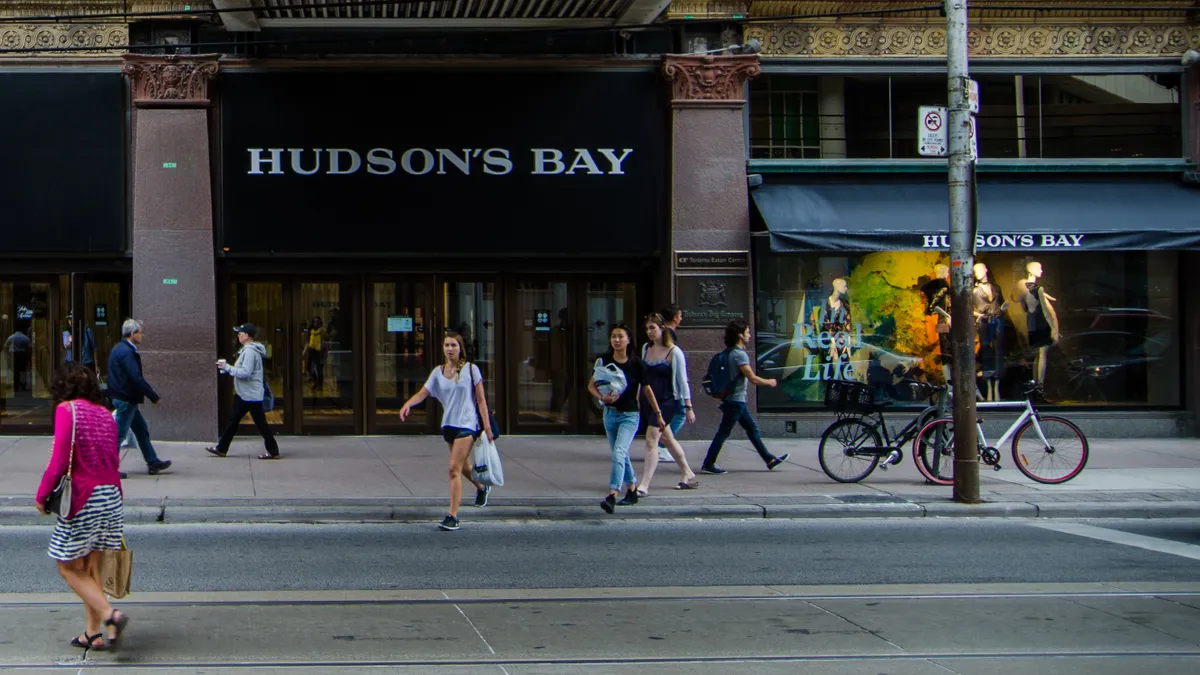UPDATE: November 1, 2019: Canadian private equity firm Catalyst Capital Group on Thursday registered its objection to the take-private agreement forged between Hudson Bay Co.'s board and a group led by HBC Governor Richard Baker. The firm announced that it and "other shareholders" holding some 28% of shares (a "majority of the minority") intend to vote against the move, calling it "nothing more than a severely undervalued share buyback" that reflects Baker's undue influence. Catalyst alone owns more than 17%, and, noting outside interest of which the firm said HBC's board is "no doubt … also aware," said it may join those parties in acquiring the company "at terms financially superior" and "not constructed to benefit an insider."
But in a statement emailed to Retail Dive, a spokesperson for the special board committee that reviewed the existing offer said it was "in the best interests of HBC and fair to the minority shareholders" and "reflects the Company’s expected performance due to the continued investment required at HBC, the deteriorating retail environment and the current market valuation of the Company’s real estate assets." That determination was made during "an independent and thorough evaluation process," further details of which will be made available to shareholders "in the coming weeks," the special committee said.
Dive Brief:
- Hudson's Bay plans to go private after its board agreed to a revised deal from the investor group that has been working to take over the Canadian department store retailer.
- The board agreed to a deal worth 10.30 Canadian dollars ($7.86 at the time of publication) per share, a 62% premium over Hudson's Bay's most recent closing share price.
- In a press release, Hudson's Bay said the deal offered a "[c]ompelling value proposition" given a "deteriorating retail environment." The deal would be financed with debt and the company's existing cash resources, and is subject to closing conditions including shareholder approval and court sign-offs.
Dive Insight:
In explaining the rationale behind taking the deal, the company cited significant cash obligations, including from the wind down of its Netherland operations, not to mention rent for its several banners. (In that expense line is Lord & Taylor, which Hudson's Bay sold to fashion rental specialist Le Tote but is still on the hook for the chain's rent payments.)
The new bid is a 9% increase from a previous offer from the buyout group, which includes Richard Baker, (the governor and executive chairman of HBC), Rhône Capital, WeWork Property Advisors, Hanover Investments and Abrams Capital Management.
The previous offer had been panned as "woefully inadequate" by an activist investor in Hudson's Bay, the hedge fund Land & Buildings. If the latest offer clears, it could bring an end to a slow-rolling boardroom drama to the company, which traces its roots back to the 17th century fur trade.
For years now, Land & Buildings has been agitating for Hudson's Bay to sell off real estate for cash and to improve its retail business by mimicking its best competitors. The hedge fund has also pressured Hudson's Bay to go private but has fought for a higher price.
In June, fund founder Jonathan Litt suggested the company could use proceeds from its European joint venture to buy the company for CA$18 a share — significantly more than the deal that just went through. Another firm took on a large stake to block the bid.
Going private could put a final end to the internal battles at Hudson's Bay, which has plenty of operational problems to grapple with. Its losses have widened this year as it closes stores, sells assets and tries to improve its remaining business. Even the company's luxury Saks unit, a leading part of the retailer's go-forward strategy, faces pricing and margin pressure.

















